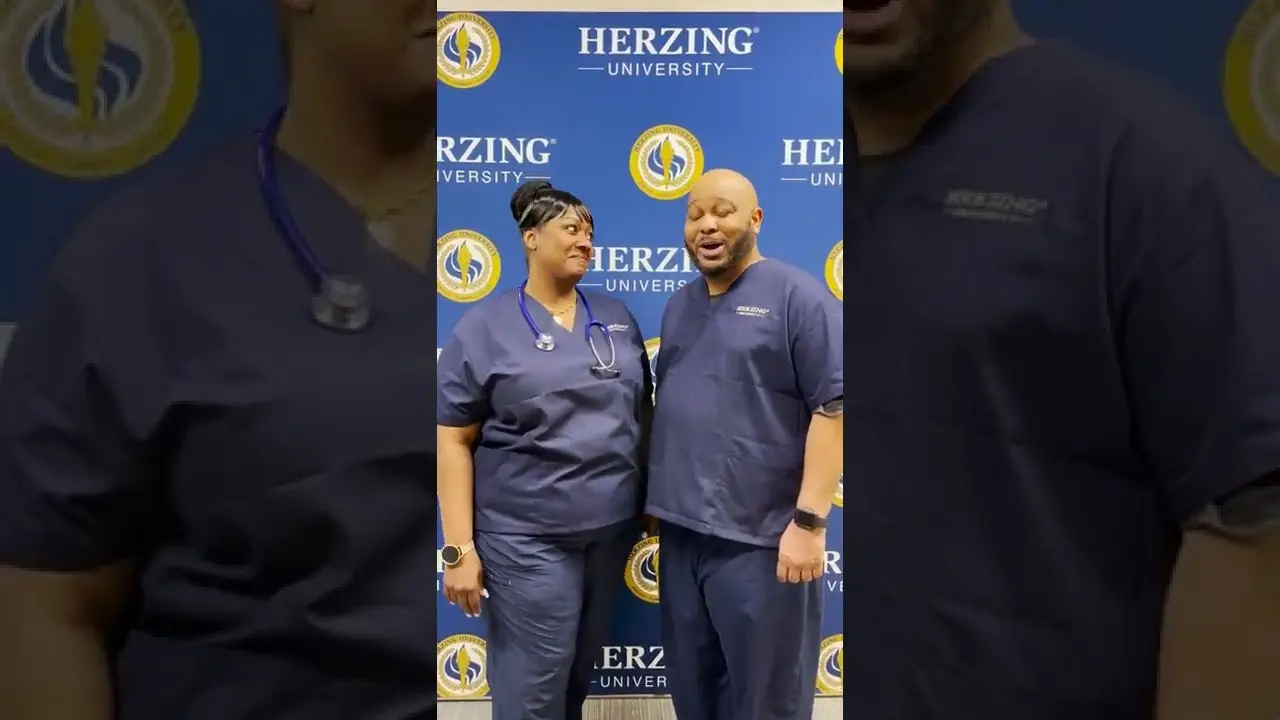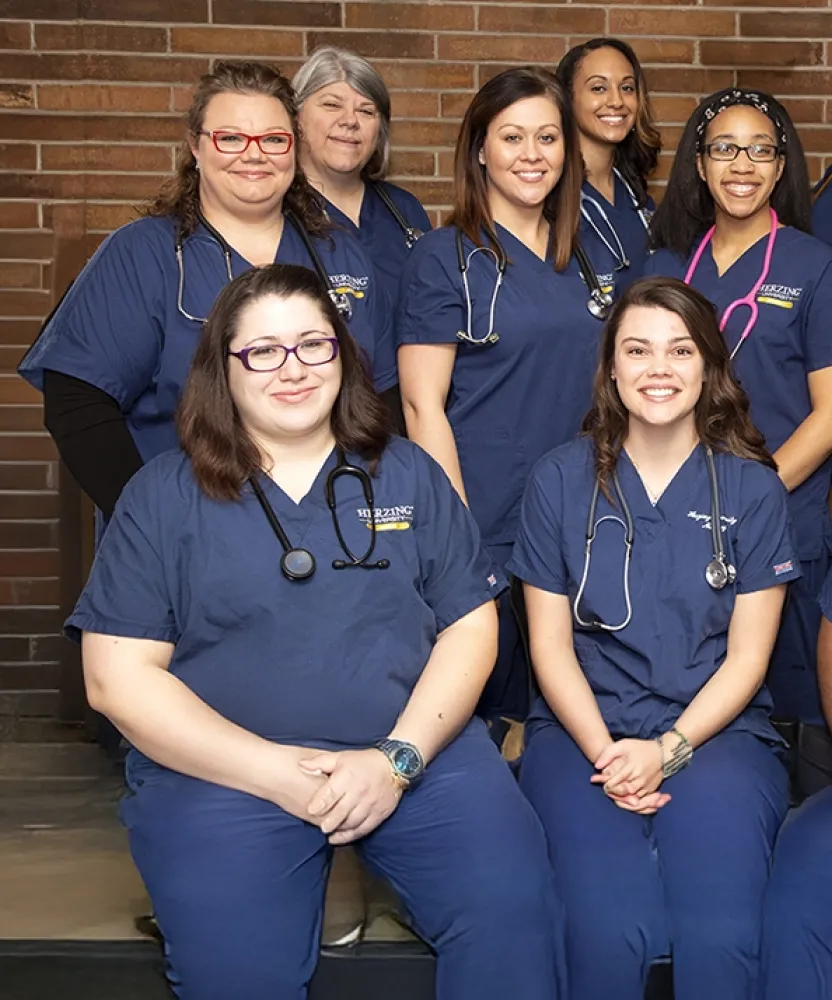Earn your BSN in Minneapolis and become possible
| Accreditation | CCNE accredited,1 Accredited by the Higher Learning Commission |
|---|---|
| Format | Hybrid format combines online coursework and traditional on-campus classes |
| Transfer credit | Transfer up to 90 approved credits |
| Pathways | Earn dual credit towards a Master of Science in Nursing (MSN) |
| Bridge options | Bridge options available for licensed practical nurses, paramedics, military medics, cardiovascular techs, and respiratory techs |
| QuickPaths | Transfer credit, stackable credentials, and adaptive learning technology build a faster pathway to a higher education with Herzing University |
Learn More Today!
Bachelor of Science in Nursing (BSN) - Minneapolis
The Bachelor of Science in Nursing degree is a 120-credit undergraduate pre-licensure program which prepares you for a career as a Registered Nurse (RN). The Minneapolis campus degree program provides students with fundamental knowledge and skills in family nursing, medical-surgical nursing, nursing informatics, health assessment, and much more.
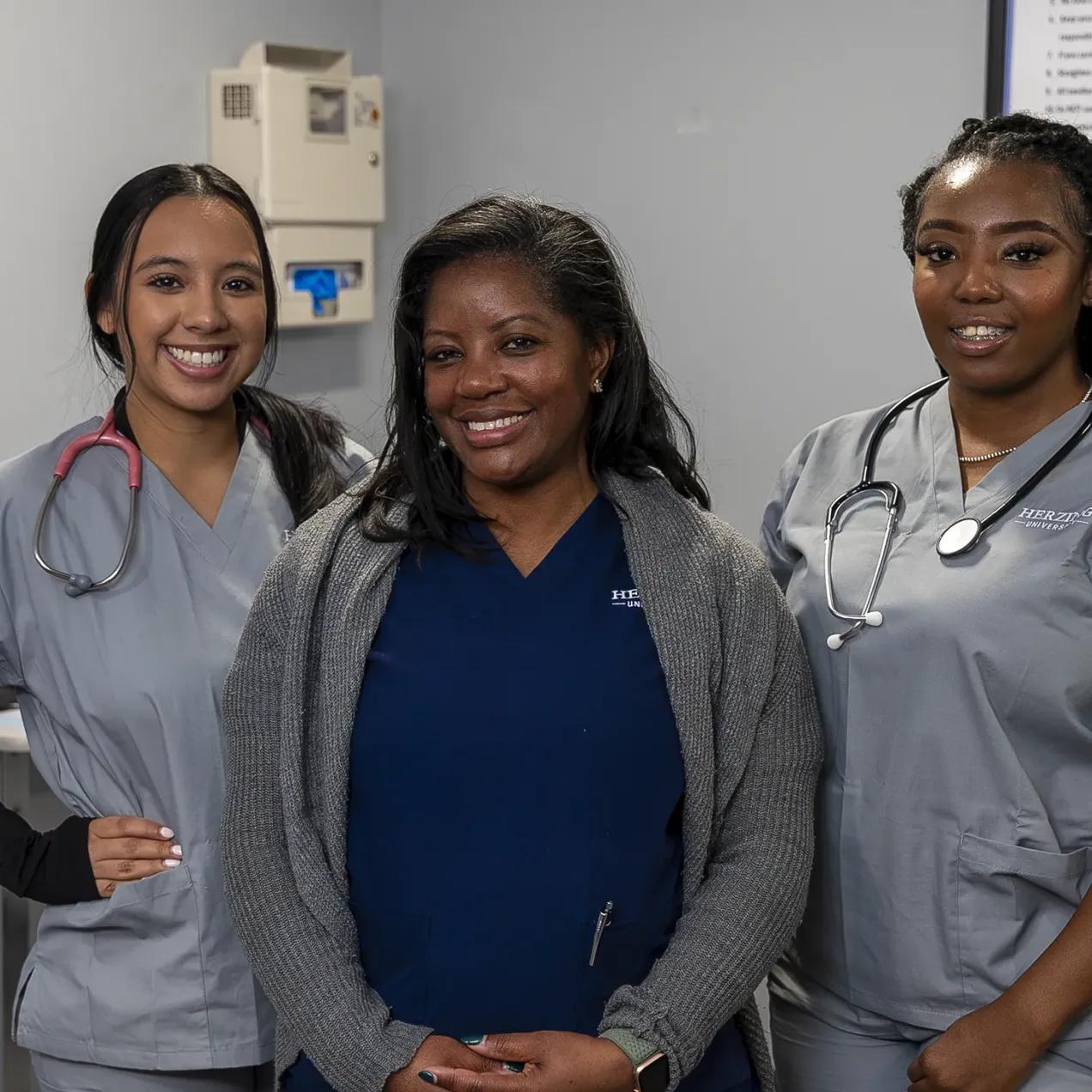
Career-focused curriculum
Discover the crucial knowledge and skills required to succeed in your work and build a foundation for continued career growth.
Flexible schedule
Hybrid delivery allows you to complete some coursework online on your schedule. We work hard to help you maintain school-life balance.
Experienced faculty
Get face-to-face instruction from experienced and credentialed faculty with real-world success in the field.
Lifelong support
We support your ongoing career advancement by providing comprehensive, personalized student services with lifelong career coaching.
Rolling admissions
No application deadlines to worry about. Apply when you’re ready and prepare to get started soon.
Courses & Curriculum Details
The Herzing University Bachelor of Science in Nursing (BSN) program curriculum focuses on providing a broad, holistic and reality-based understanding of the roles and responsibilities of a professional nurse. Main topics in the curriculum cover health promotion, risk reduction, disease prevention, illness and disease management.
- Enroll smoothly. No jumping through hoops. Transfer prior credits and get enrolled without a long wait.
- Engage with faculty. A 16:1 student-faculty ratio means you’ll have access to faculty both in and out of class.
- Earn dual credit. Complete select graduate-level classes for dual credit towards a master’s degree.
Upon completion, you will be prepared to sit for the NCLEX-RN and earn licensure in the state of Minnesota.
| Program | Months i | Semester Credits |
|---|---|---|
| Bachelor of Science in Nursing (BSN) | 36 | 120 |
Average number of months for students to complete program
Required Courses in Nursing
All courses, 66.00 semester credit hours, are required.
Dual Credit Option for Taking Graduate Level Courses
Dual Credit Options are not available for New Orleans students. See Academic Information for full requirements under title Earning Graduate Credits as an Undergraduate Student. Undergraduate Course Graduate Course Equivalency NSG 321 Advanced Leadership and Management NU 730 Systems-Based Practice (Transferrable to MSN & DNP Programs) NSG 324 Evidence Based Practice in Nursing NU 602 Epidemiology, Research, and Theory (Transferrable to BSN to DNP Program Only) NSG 421 Nursing Informatics NU 725 Technology and Nursing Informatics in Advanced Practice (Transferrable to MSN & DNP Programs) NSG 423 Policy, Trends, & Ethics in Nursing HA 610 Health Policy and Management (Transferrable to MSN Program, except for MSNWHNP)
Required Courses in General Education
Students enrolled in the BSN program must complete a minimum of 52.00 semester credit hours in general education distributed among the following disciplines. A minimum of 9.00 semester credit hours must be upper level (300- to 400-level courses). The Herzing University General Education offerings are listed below. Refer to the General Education section of the catalog for additional information on general education requirement. 12.00 Semester Credit Hours in Communications EN 104 English Composition I EN 111 Information Literacy EN 116 Speech EN 304 English Composition II 16.00 Semester Credit Hours in Science SC 154 Anatomy and Physiology I for Nurses SC 254 Anatomy and Physiology II for Nurses SC 150 Principles of Nutrition SC 166 Microbiology SC 186 Chemistry 9.00 Semester Credit Hours in Humanities HU 140 Cultural Diversity HU 240 Introduction to Humanities HU 340 Humanities and Contemporary Popular Culture 6.00 Semester Credit Hours in Mathematics MA 109 College Algebra MA 320 Statistics 9.00 Semester Credit Hours in Social or Behavioral Science PS 101 Psychology PS 105 Developmental Psychology SS 350 Social Issues and Technology Note: Transfer students may transfer courses that are within 1.00 semester credit hour of the courses listed above to meet these discipline requirements. Any resulting deficiency in the total of 52.00 semester credit hours required in general education may be made up with general education electives from any of the listed disciplines. Science courses being transferred in from other institutions must meet the nursing program science requirements.
Special General Education Grading Requirements for Nursing Support Courses
The following science courses must be completed with a grade of "B" (80%) or better. Only two attempts are permitted for each course and a student who fails to successfully complete in the maximum attempts is subject to dismissal from the nursing program. SC 154 Anatomy and Physiology I for Nurses Semester Credit Hours: 4.00 SC 254 Anatomy and Physiology II for Nurses Semester Credit Hours: 4.00 The following general education courses must be completed with a grade of "C" (70%) or better for a student to continue in the nursing program. *BSN students enrolled in the Atlanta Campus require a "B" (80%) or better in SC 166 Microbiology and SC 186 Chemistry. PS 105 Developmental Psychology Semester Credit Hours: 3.00 SC 150 Principles of Nutrition Semester Credit Hours: 2.00 SC 166 Microbiology Semester Credit Hours: 3.00 SC 186 Chemistry Semester Credit Hours: 3.00 MA 109 College Algebra Semester Credit Hours: 3.00 MA 320 Statistics Semester Credit Hours: 3.00 A student who is dropped from the nursing program for failing to achieve the minimum grade specified in the courses listed above, but who otherwise meets the academic standards of the University may transfer to another Herzing degree program and/or may appeal to reapply to the BSN nursing program in a future semester.
Personal and Professional Development Courses
All courses, 2.00 semester credit hours, are required.
Resuming students should refer to the section on re-entering for additional requirements.
Distribution of Contact Hours by Course
Distribution of Contact Hours by Course Course or Category Lecture Lab Clinical Total Contact Hours Credits NSG 120 45.00 45.00 3.00 NSG 121 30.00 30.00 60.00 3.00 NSG 122 45.00 30.00 45.00 120.00 5.00 NSG 123 45.00 135.00 180.00 6.00 NSG 124 45.00 45.00 3.00 NSG 221 45.00 45.00 90.00 4.00 NSG 222 60.00 90.00 150.00 6.00 NSG 223 60.00 90.00 150.00 6.00 NSG 321 45.00 45.00 3.00 NSG 323 60.00 45.00 105.00 5.00 NSG 324 45.00 45.00 3.00 NSG 421 45.00 45.00 3.00 NSG 233 45.00 30.00 45.00 120.00 5.00 NSG 423 45.00 45.00 3.00 NSG 425 30.00 135.00 165.00 5.00 NSG 426 45.00 45.00 3.00 EN 101 45.00 45.00 3.00 EN 111 45.00 45.00 3.00 EN 116 45.00 45.00 3.00 EN 304 45.00 45.00 3.00 SC 150 30.00 30.00 2.00 SC 166 30.00 30.00 60.00 3.00 SC 186 30.00 30.00 60.00 3.00 SC 154 45.00 30.00 75.00 4.00 SC 254 45.00 30.00 75.00 4.00 MA 109 45.00 45.00 3.00 MA 320 45.00 45.00 3.00 HU 140 45.00 45.00 3.00 HU 240 45.00 45.00 3.00 HU 340 45.00 45.00 3.00 PS 101 45.00 45.00 3.00 PS 105 45.00 45.00 3.00 SS 350 45.00 45.00 3.00 PD 121 15.00 15.00 1.00 PD 202 15.00 15.00 1.00 Totals 1485.00 210.00 630.00 2325.00 120.00
Enrollment requirements
To be considered for admission into the program, you must hold a high school diploma or equivalent (Diploma, HSED or GED) and meet the following criteria based on your cumulative GPA:
| Cumulative GPAi | Science Requirement | TEASii |
|---|---|---|
| 3.50–4.00 | None | None |
| 3.00–3.49 | 3.00 GPA in college scienceiii | None |
| 2.50 and higher | None | Composite TEAS of 58 |
i. Students with 18 or more transferable collegiate credits will be assessed on their collegiate cumulative GPA. Otherwise, the high school GPA will be used. ii. The Test of Essential Academic Skills (TEAS) from the Assessment Technology Institute (ATI). iii. Based on your cumulative GPA in these college science courses: Anatomy & Physiology I and II, Biology, Chemistry, and Microbiology. Two of these courses must be used to calculate science GPA. Any of these courses completed must be included in the calculation, and no others. If you do not meet this requirement, you must score a composite score of 58 or higher on the TEAS. A grade of "B" or better must be earned for transfer credit to be awarded for Anatomy & Physiology, regardless of whether it was included in the calculation. | ||
Herzing University is your learning partner for life
We offer BSN programs designed for you – no matter where you are in your education right now and where you want to be.
We've got several BSN pathways to choose from in addition to our pre-licensure BSN program on-campus in Minneapolis:
For non-nurses
Additional pathways for those new to nursing
Accelerated BSN. Built for bachelor’s degree holders in another field—start your second career!
Pre-nursing. A pathway for students who are not eligible for direct entry into the BSN program.
For practicing nurses
Pathways to take the next step
RN to BSN. Current RNs can bridge to their BSN in as little as 1 year—available online!
LPN to BSN. Current Licensed Practical Nurses (LPN) can earn their BSN faster by enrolling in our LPN to BSN option.
For health professionals
Transition to nursing faster
We offer unique bridge to BSN options for additional healthcare professionals seeking to become a registered nurse:
Respiratory Therapist (RT) to BSN
Waived Enrollment Fee
Discover the educational pathway designed to maximize your career potential. Reach for greater heights with Herzing University.
Find your calling as a registered nurse
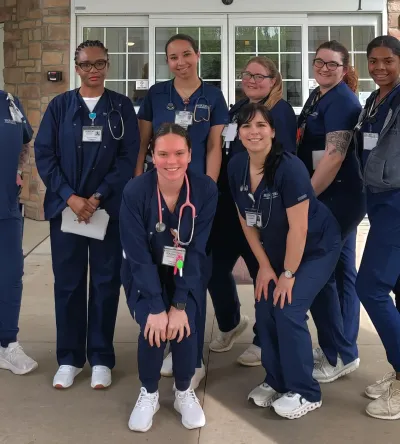
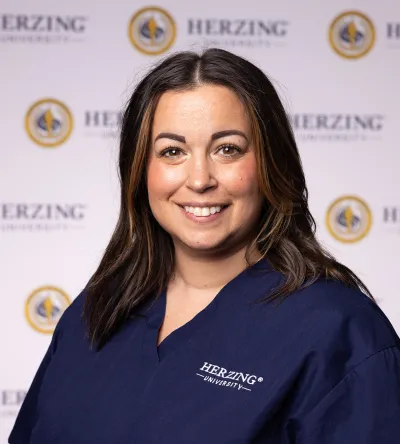
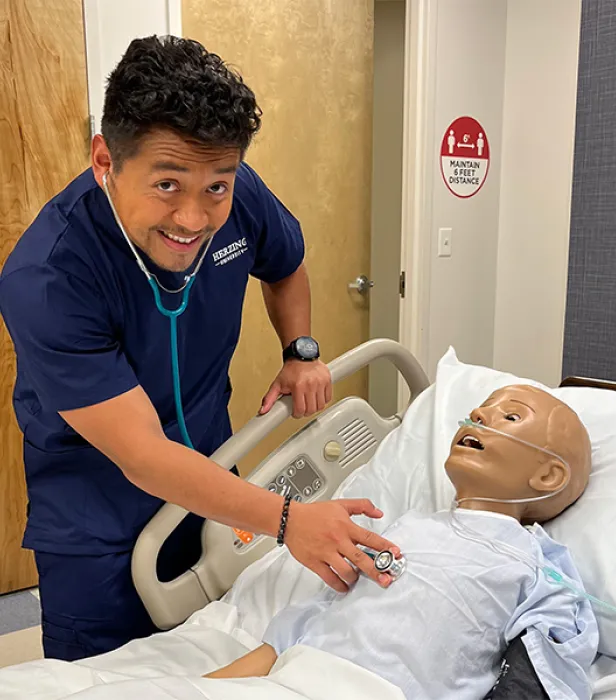
Earning your BSN not only helps you become a registered nurse, it sets a strong foundation for you to continue to advance your career. Nurses with an associate degree may find roadblocks in certain career opportunities without a BSN.
There are many types of registered nurses, and in order to choose your preferred nursing specialty you may be required to hold a bachelor degree in nursing. Earning a bachelor's degree is a common prerequisite in a master's degree program.
Salary and job outlook
According to the Bureau of Labor Statistics, employment of registered nurses is expected to rise 5% from 2024-2034, and their average salary is $98,430 per year ($47.32 per hour).*
Now is a great time to begin earning the education you need to find a great job in healthcare, build a foundation for career growth and make an impact in your community.
Faq
Frequently Asked Questions
Didn't find the answer to your question? Send us an inquiry and we will be happy to answer all your questions!
Because nurses with a BSN have earned that next degree level and generally have the edge on the job market, they will on average earn a slightly higher salary than nurses with an ASN. However, there are always exceptions; an ASN with several years of an experience may earn a higher salary than an RN with a BSN who is just starting their career.
We offer online associate, bachelor's, and master's degree pathways for those without nursing experience looking to become an RN. Eligibility varies by state of residence.
Learn more about our online nursing programs designed for non-nurses.
With Herzing University you are never alone. It’s our goal to provide all students an affordable, career-driven education. Financial aid options include:
- Loan options – Federal & private
- Scholarships & grants
- VA / military benefits
- Other sources of financial aid
You can find an estimate for tuition and expenses by using the Herzing University tuition wizard.
There are many different nursing specialties to choose from. Depending on your personality, educational background and preferred working environment you can follow your own personalized path in the nursing profession.
Here are a few popular nursing specialties you may consider:
- Aesthetic or Cosmetic nurse
- Assisted living nurse
- Cardiac/cardiovascular nurse
- Emergency room nurse
- Flight nurse
- Home health nurse
- Labor and Delivery nurse (L&D)
- Med/surgical nurse
- Neonatal/NICU nurse
- Nurse Anesthetist
- Nurse paralegal
- Oncology nurse
- Pediatric nurse
- Public health nurse
- School nurse
- Travel nurse
You can take our nursing personality quiz to get a better idea of what you might prefer in your nursing career.
The advantages of a BSN can include:
- Increased autonomy in decision making while on the job
- Open doors to more specialties in the nursing field
- Become a more attractive candidate for hospitals seeking Magnet Recognition
- Build a foundation to grow into education or leadership pathways
- Positions you better for nursing jobs with higher pay
- Qualify to enroll in an MSN program
- Become more familiar and educated with evidence-based practice opportunities
- Increase knowledge and understanding of RN specialties and skills
- Transition from “technical” to “professional” RN
- Gain a deeper knowledge of nursing theory and leadership theory
A 2023 study from the American Association of Colleges of Nursing (AACN) indicates employers have the level of education at top of mind in the hiring process. Based on responses from nursing schools, the survey revealed 69.8% of employers show a strong preference for BSN graduates.
The ultimate benefit is bettering yourself, becoming the best nurse you can be and following the career path of your choosing.
There are a wide variety of different career paths in nursing, and depending on what makes the most sense for you there are several different types of nursing degrees you may consider:
- Diploma in Practical Nursing. The fastest way to start your nursing career is to earn a diploma in practical nursing and become a Licensed Practical Nurse. This isn’t a “degree” but it’s an alternative starting point if you’re ready to get your feet wet in nursing.
- Associate degree in nursing. Earn an associate’s degree in nursing and you’ll be eligible to sit for the NCLEX and become a Registered Nurse (RN).
- Bachelor’s in nursing. A bachelor’s degree is becoming the new educational standard for registered nurses, and it will qualify you for a master’s degree program.
- Master’s in nursing. Many roles up the ladder in nursing will require a master’s degree.
- Doctorate in nursing. Earn the terminal degree in nursing and reach the top of the field.
All schools have their own distinct degree programs based on their qualifications and areas of focus. Herzing University offers many different options to provide the shortest path to your destination no matter where you are right now, including campus bridge programs and online programs to help you reach the next level in your education. View all of our nursing programs.
Yes, general education and didactic/lecture nursing courses can be completed in our 3-year online BSN program for non-nurses.
The program does incorporate hands-on training, including clinicals and an intensive experience to ensure you are equipped to pass the NCLEX-RN, meet the board of nursing requirements in your state and become an RN-BSN.
It’s a question of:
- What your goals are
- How quickly you want to reach them
If your goal is to go from LPN to RN quickly, the best choice may be an associate’s degree program since you may be able to become an RN in less than 2 years.
If your goal is to become an RN and potentially advance further by working towards a master’s degree in nursing (MSN), your best option is a bachelor’s degree in nursing program.
Read about the most basic differences between ADN vs. BSN and discover what's best for you.
You don’t need a bachelor’s degree in nursing to become a registered nurse. Earn your associate’s degree in nursing and you can become an RN more quickly and earn your first set of scrubs.
However, if your goal is to continue climbing the ladder to become a nurse practitioner or pursue roles in nursing leadership or administration, you may be best off enrolling in a BSN program so you can reach your goals faster.
No matter what you choose, Herzing is here to empower you to become the best nursing professional you can be.
"Registered nurse" represents a broad category of potential duties involving many areas of healthcare. The typical roles and responsibilities of an RN span several categories, including:
The Student Experience at Herzing
I heard about Herzing University through a family member. I went to the nursing information session and loved how the process was so different from any other school.
Michelle Castleberry
Nursing Student | Atlanta CampusThe faculty here make themselves available during their designated office hours, but if you need extra help, they will meet at times that will work for YOU.
Barbara Mulcahy
Nursing Student | Madison CampusWhen I first learned about Herzing University, I had already been working as a certified nurse’s assistant (CNA) for eight years. I loved the job, but I felt that I had potential to become something more. My co-workers encouraged me to become a registered nurse and told me about Herzing’s BSN program. I knew that nursing was the right career for me, so I enrolled and was able to start right away!
Nabeela Rehan
Nursing Student | Brookfield/Milwaukee CampusNow that I have my degree, I’m focusing on my career. In fact, I already have a job set up and I can’t wait to see where the future takes me!
Gabriella Paige Comstock
Nursing Student | Brookfield/Milwaukee CampusPersevering through your courses and clinicals is such a valuable experience, and I can’t wait to apply what I’ve learned in the field.
Nickolas Flotman
Nursing Student | Minneapolis CampusI love Herzing University because they gave me the opportunity to further my education and reach my goal of becoming a registered nurse (RN).
Barbara Allen-Johnson
Nursing Student | Orlando CampusAccreditation & Disclosures
1. The baccalaureate degree program in nursing at Herzing University Minneapolis is accredited by the Commission on Collegiate Nursing Education (http://www.ccneaccreditation.org).
Herzing University is accredited by the Higher Learning Commission (hlcommission.org), an institutional accreditation agency recognized by the U.S. Department of Education.
* BLS pay estimates calculate the median annual wage for various occupations. Per the BLS the median wage for an occupation is: "The wage at which half of the workers in the occupation earned more than that amount, and half earned less. Median wage data are from the BLS Occupational Employment and Wage Statistics survey." Bureau of Labor Statistics (BLS), U.S. Department of Labor, Occupational Outlook Handbook 2024. BLS median wage estimates do not represent entry-level wages and/or salaries. Multiple factors, including prior experience, age, geographic market in which you want to work, and degree level and field, will affect career outcomes, including starting salary and earnings as an experienced employee. Herzing neither represents that its graduates will earn the median salaries calculated by BLS for a particular job nor guarantees that graduation from its program will result in a job, promotion, particular wage or salary, or other career growth.
Recent Blog Posts
Waived Enrollment Fee
Discover the educational pathway designed to maximize your career potential. Reach for greater heights with Herzing University.

